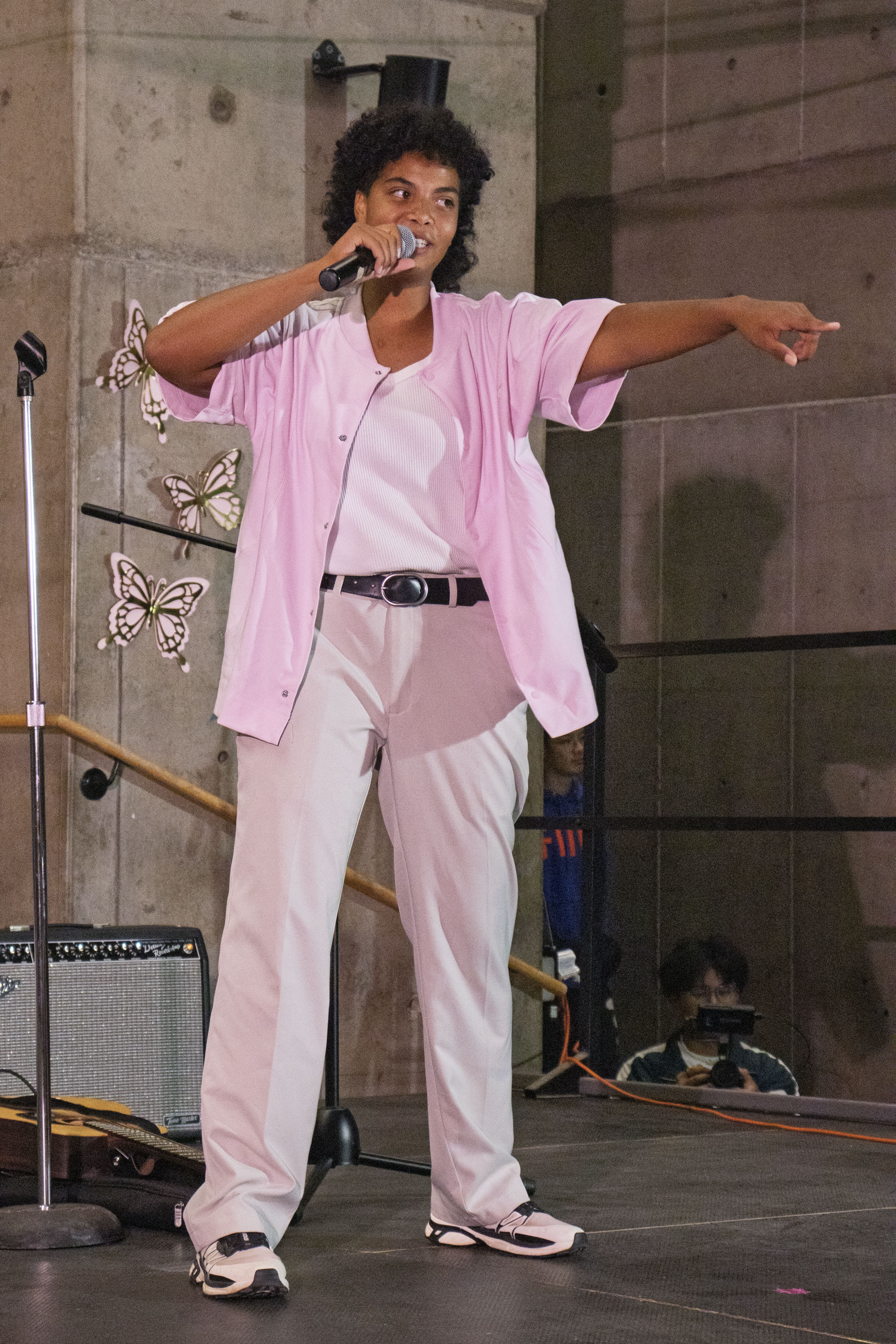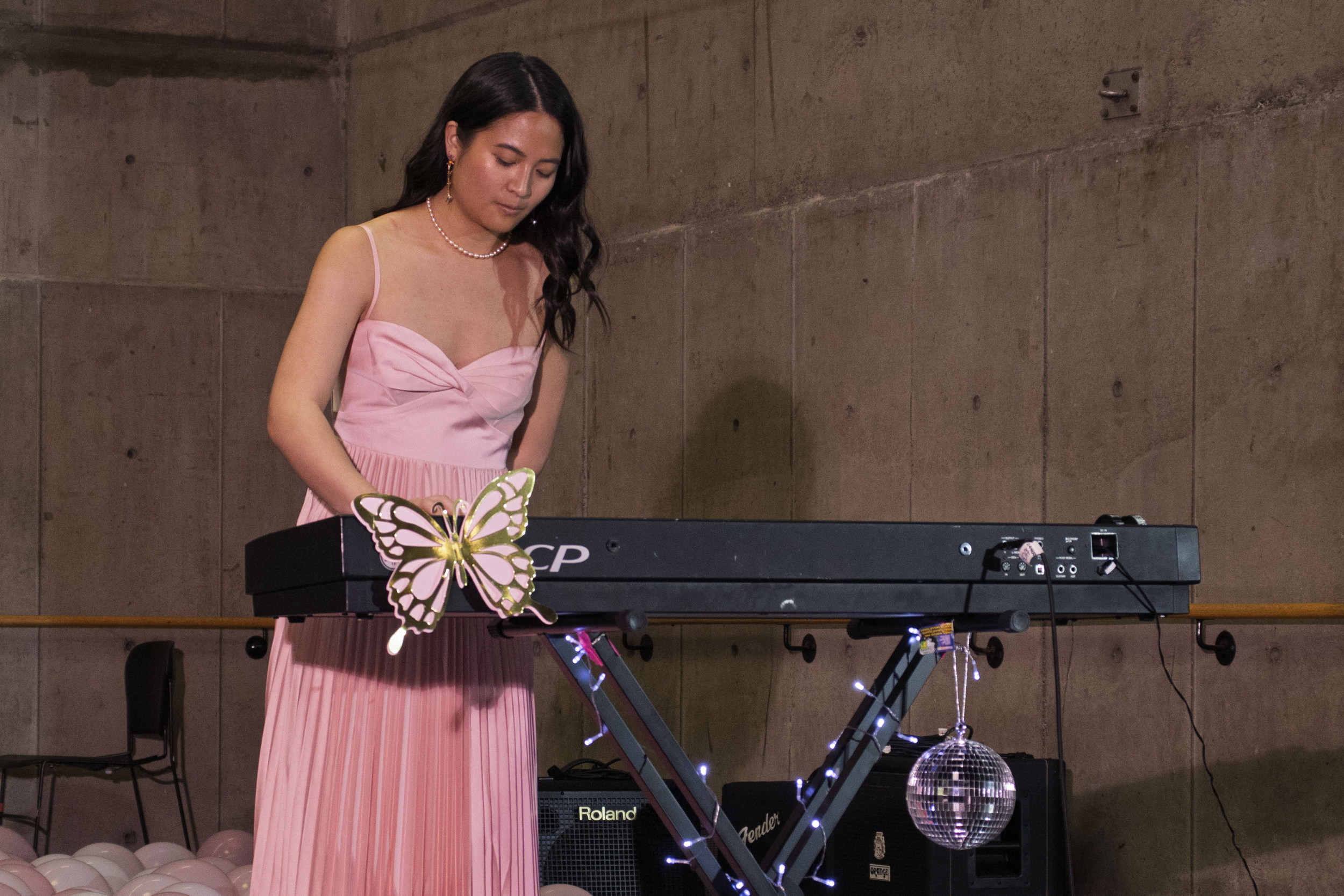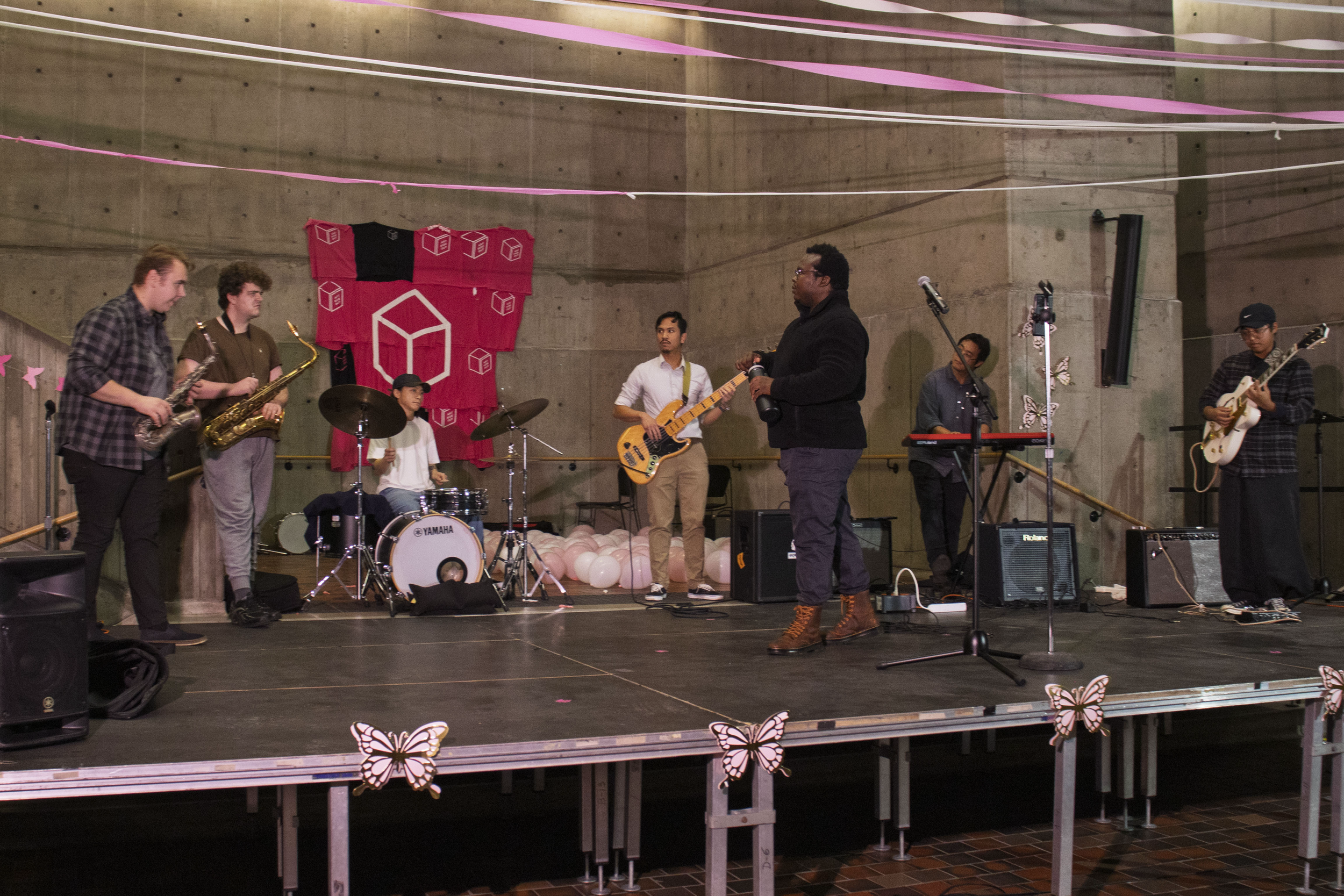University of Toronto Scarborough’s ARTSIDEOUT 2024 Recap
Talented performers show off their skills at UTSC’s annual art exhibit, ARTSIDEOUT.
Sakshi Kale during her Odissi dance at ARTSIDEOUT (Photo by: Christian Zdravko // The Underground).
ARTSIDEOUT’s latest exhibit has shone light on the talent found at University of Toronto Scarborough (UTSC). The event, which took place at the campus’ Meeting Place on Oct. 3, 2024 featured artworks and performances from some of the school’s most creative students.
The performances were mostly musical, consisting of singing, guitar, piano, and even hip-hop.
The first artist, a second-year international development and political science student, Sakshi Kale performed a visual and theatrical Odissi dance. Odissi is one of India’s classical dance styles. Odissi uses movement, hand gestures, and facial expressions to tell stories found in Indian literature. Kale says she has been practicing Odissi for 15 years, since she was four years old. Last year, she received her certification as a professional dancer. Kale calls her performance “a mix between a dance and a one man play.”
Mahe Rabésa was the second to hit the stage, with a musical performance featuring her singing and playing guitar. Rabésa is a second-year transfer student from Brandon University, Manitoba, and raised in Montreal. She studies arts management. Music has been a part of her life for a long time, having done piano lessons from 6 to 12 years old. Around then, she decided to pick up the guitar and teach herself how to play. She says music is her outlet to expressing emotions.
Rabésa pointing to the crowd during her performance (Photo by: Christian Zdravko // The Underground).
While she produces on piano, Rabésa prefers the guitar because she is allowed more mobility on stage.
Originally, she never cared to sing, sticking to musical instruments like guitar, piano, bass, drums, and ukulele, until one day, when she was missing her recorded voice track for her performance, and had to recite the lyrics by heart. It was a great experience, so she didn’t look back.
Rabésa says she wants musical performance to be her full-time career, which led to her decision to study arts management. She had previously considered a masters in commerce in Montreal. Some of her favourite parts of her job is her freedom to choose her gigs. One of the toughest parts of her job is financially sustaining herself at an early stage of her career.
“I'm spending a lot of money and not getting a lot of money. For example, when you go to a studio, it's super expensive, and the only thing to get money is shows, like live performances. It's really hard when you're not known, like in Toronto, or in Montreal. People won't offer to pay you to play.”
Being prepared for anything is a virtue for a musician, she says.
“Don't expect to go there and everything will be perfect. No, there will be no sound engineer, there will be no sound people, or there's no electricity, and you thought there was gonna be electricity. — You need to own it and when there's troubleshooting, you're not gonna be awkward on stage.”
To survive in this industry, she says “you truly have to love it. Rabésa will be busy performing in Montreal this coming summer.
Anechka Saniel, a fourth year journalism major, minoring in both studio arts and English, performed her composition, Astraloria, “a story of a princess and a knight,” at ARTSIDEOUT. Despite some obstacles, Saniel feels she nailed the show.
“It went way better than I expected. I think I was overthinking it a lot before the performance. I did practice a bit too last minute, but that's normally how I go. I work better under pressure anyway. I think there was some minor mistakes where there was a key that was stuck in the keyboard, so I had to improvise around it.”
Anechka Saniel playing the piano for her ARTSIDEOUT performance (Photo by: Christian Zdravko // The Underground).
Piano has been a crucial part of her life, and will forever be a part of her life. For Saniel, it has always been her “area of freedom.” She says she pulled all-nighters playing piano.
“I think [piano’s] always going to be part of my career no matter what I do. I mean, I've been playing for this long, why would I give it up? I grew up with strict Asian parents, and they made me do it in the first place, but over time, I've definitely learned to love the instrument.”
Astraloria has been in the making for several months, Saniel says.
“I've been working on it since the summer, ever since I found out that ARTSIDEOUT was releasing applications for the special projects, and I really wanted to put in my all.”
Saniel planned for the project to be more grandiose than it was, but because of time constraints, she had to do what she could.
Lower Bay Station, the ‘Toronto Jazz Hop Collective,’ although doesn’t consist of UTSC students, were the last ones to take the stage at the event.
(Photo by: Christian Zdravko // The Underground).
The group has been around for around a year. Performing shows all around Toronto.
While the bandmates have other full-time jobs, and currently perform together as a side gig, Markus Baker, the band’s MC, says they would play full-time if they could.
“Right now, it's mostly just playing as many shows as we can, and just having fun with it, and kind of seeing where the journey goes. Luckily, a lot of us are also quite business savvy, so we've been climbing quite well and quite consistently.”
The band is inspired by jazz musicians like Roy Hargrove, and hip-hop symbols like The Roots, Outkast, and Kendrick Lamar. Baker says he likes both him and Drake for different reasons.
Baker says having a group of friends he can trust is one of the best parts of working with Lower Bay Station.
“When we get together, it's a fun time, every time. It's never boring. It never feels like it's forced. It never feels awkward. We can always laugh and enjoy ourselves. I think that's the biggest thing. But also, I can definitely say on the flip side, too, if there's something that we need to talk about, we can talk about it openly and feel confident that we're going to be heard and understood.”
Nick Hanson, the band’s saxophonist, says he loves that everyone brings original ideas to the table, and everyone is open to experimenting with different sounds. “We're always down to explore an idea that even if sometimes my ideas are a little weird.”
“We're always down to explore an idea that even if sometimes my ideas are a little weird.”
Hanson says one of the band’s largest challenges is coming up with new
“I think a lot of my problems with the band are problems that everyone in the Toronto music team has; that it's really hard to find good gigs, and there's a lot of organizers, and a lot of venues that are f*cking around.”
When it comes to succeeding in the music industry, Hanson calls it “a pretty nebulous term.” Baker says in both the business side and the artistic side, self advocacy is crucial. “You have to find your voice, talk what you mean, and really listen to what you say.”
Apart from performances, students displayed creative pieces around Meeting Place with various styles and messages.
One piece, Wife material by Tala Eltahir symbolizes the common belief that a woman’s worth is dependent on her desirability to men.
“Since childhood, I and many other girls were mentored by our mothers on how to be the perfect wife to our future husbands. We were taught to cook, clean, and tolerate various levels of disrespect from men, in the hopes that one day we'd be worthy enough to find a man who will take us in as treasured wives. What this instills, instead, is a constant need to be perfect in a world of imperfection, to criticize and tailor oneself to a shred of one's humanity - to be whatever he desires,” Eltahir wrote in her project’s description.
Wife material by Tala Eltahir at ARTSIDEOUT 2024 shows a collage full of pink colours on a white fabric, symbolizing dominant expectations of women in society (Photo by: Christian Zdravko // The Underground).
Apart from the main event, ARTSIDEOUT also featured chalk work around the campus, and small shops outside of Science Wing (SW) selling books, trinkets, etc.




